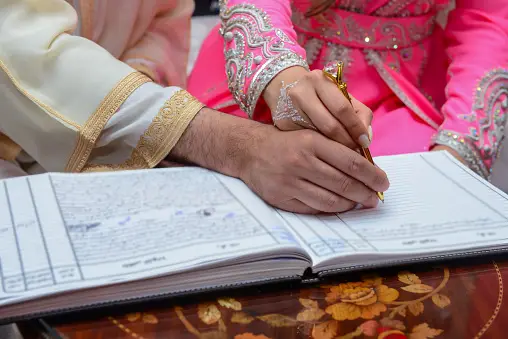Factors to Consider When Choosing a Life Partner
Choosing a Life Partner involves considering various essential factors. First and foremost, prioritize a partner’s religious and moral values. While wealth and lineage hold some significance, they come second to moral and religious principles. A husband embodying strong moral and religious values takes precedence.
It’s vital to avoid partners displaying negative traits such as neglecting prayers or having a reputation for alcohol consumption. The teachings emphasize choosing a partner based on their moral and religious character. The Messenger of Allah advised marrying a person with appealing religious and moral values, putting religion and morals at the forefront of the selection process.
The Importance of Religion and Morals
Religion and morals play a critical role in establishing a family’s foundation. Selecting a partner who upholds these values ensures a harmonious and spiritually enriching life. A husband embodying religious virtues becomes a beacon for his family, imparting essential lessons of religion and morality to his wife and children. A woman should prioritize a partner who embodies these virtues for a righteous and nurturing family environment.
Additionally, considering a potential partner’s genealogy is encouraged, if possible. The guidance suggests marrying someone with appealing religious and moral qualities when genealogy aligns. However, if attributes remain equal, focus primarily on religious and moral standing.
Understanding Premarital Relations
Religion provides clear guidelines concerning premarital relations. Distinguishing between pre-marriage and post-marriage relations is essential. Premarital relations, including conversations, sight, or solitude with a non-mahram woman, are strictly forbidden. Islam stresses the sanctity of marriage, and any form of intimacy before marriage is deemed haram (forbidden).
On the other hand, post-marriage relationships, including interactions and bonding between spouses after the marriage ceremony, are completely acceptable and encouraged. Marriage marks the sacred bond, and any relationship formed within this bond is considered righteous and permissible in the eyes of religion.
In summary, the emphasis lies in upholding religious and moral values when choosing a life partner. Moreover, clear boundaries are established regarding premarital relations, promoting a righteous and pious approach to relationships as per religious teachings.
Understanding Contraception and Family Planning in Islamic Perspective
In the realm of intimate relations within a Muslim marriage, questions often arise regarding contraception, family planning, and the permissibility of separating sexual intercourse. This blog aims to delve into these matters through the lens of Islamic teachings, providing clarity on when it is permissible for a woman to use contraceptive pills, the Islamic stance on family planning, and the permissibility of isolating during intercourse.
Contraceptive Pills: Permissibility and Conditions
Islamic teachings emphasize the importance of procreation and expanding the ummah. The Prophet Muhammad encouraged Muslims to marry women who can bear many children, viewing the growth of generations as a source of strength. However, there are conditions under which contraceptive pills can be deemed permissible for a woman.
The first condition is the woman’s genuine need for contraception, such as health issues or physical weakness preventing her from conceiving every year. The second condition necessitates the husband’s consent, as he has a say in matters of childbirth. Additionally, consulting a medical professional is crucial to ensure the safety and appropriateness of using contraceptive pills.
It’s essential to highlight that contraceptive pills should not be used to prevent reproduction indefinitely, as this could pose a risk of infertility. Hence, temporary use based on necessity is allowed within Islamic teachings.
Family Planning and Its Permissibility
Islamic teachings do not advocate a rigid family planning approach that sets specific numerical limits on children. Pregnancy and non-pregnancy are viewed as outcomes under the divine control of Allah. Attempting to establish fixed numerical limits on children may be rendered futile due to unforeseen events like epidemics or accidents that can alter circumstances abruptly.
Islam permits the temporary suspension of pregnancy when necessary, aligning with the belief that Allah is the ultimate controller of procreation. The decision to delay pregnancy temporarily is based on individual circumstances and needs, always with respect to Islamic principles.
Isolating During Intercourse: A Clarification
Another aspect inquired about is the permissibility of isolating during intercourse. Islamic teachings address this concern, affirming that it is permissible to separate during Maalama without a specific reason. This practice was observed during the time of the Prophet Muhammad, indicating its acceptance within the faith.
However, divorcing a woman without her consent during such separation is not allowed, as a woman also has the right to bear children. Moreover, withholding consent impairs the husband’s right to enjoyment, integral to marital intimacy. Permission from both parties is crucial to prevent harm and ensure a healthy relationship dynamic.
Islam emphasizes procreation and the growth of generations within the ummah. While contraceptive pills may be used under specific conditions, permanent prevention of reproduction is discouraged. Family planning, within the bounds of necessity and Islamic teachings, is permissible, acknowledging Allah’s ultimate control. Lastly, isolating during intercourse is acceptable if both partners consent, affirming the balanced approach that Islam advocates within intimate relationships.
Living with a Prayerless Husband
In a marriage, harmony often hinges on shared values and practices. However, what if a husband demonstrates indifference towards religion, neglecting prayers and Ramadan fasting? It’s essential to examine the options in such a situation.
Gaining Insight through Quranic Perspective
The Quran provides explicit guidance for believers encountering interfaith relationships. When a spouse strays from their faith, notably by neglecting obligatory prayers, they fall into the category of disbelievers. In such cases, a Muslim woman must contemplate her options, given the gravity of the situation.
The Quran unambiguously states that believing women is incompatible with unbelieving men and vice versa, underscoring the significance of faith within a marital context.
Addressing the Husband’s Behavior
Beyond the religious disparity, the husband’s suspicious behavior compounds the challenge. This conduct might be symptomatic of a psychological condition related to worship and social interactions. In these circumstances, the recommended course of action is separation from such a spouse to preserve the believer’s faith and mental well-being.
It’s advisable for the husband to seek refuge in religion, engaging in dhikr and wazkar to alleviate doubts and obsessions. Through sincere repentance and a return to the path of Islam, the husband may find the divine guidance needed to mend the marital relationship.
Marriage of a Missing Man’s Wife
Another intricate scenario in Islamic jurisprudence unfolds when a man goes missing, leading his wife to remarry. The crucial question pertains to what occurs when the missing husband returns. Does the second marriage retain its validity, or does the first husband have the right to reclaim his wife?
Exploring the Concept of “Marriage of the Wife of a Missing Man”
In Islamic jurisprudence, this circumstance is termed “marriage of the wife of a missing man.” If a wife remarries after the waiting period (idda) and her missing husband returns, the first husband faces two choices. He can opt to validate the second marriage, allowing it to remain in force, or he can choose to reclaim his wife.
Should the first husband decide to uphold the second marriage, it retains its validity. However, if he elects to reunite with his wife, she must return to him. Nevertheless, consummation is not permitted unless she enters into another marriage and obtains a divorce or becomes widowed from that union.
Legal Status of the Child from the Second Marriage
Regarding the child born during the second marriage, which took place during the missing husband’s absence, the child is deemed legitimate in the eyes of Shariah law. The second husband is recognized as the child’s legal parent, resulting from a lawful union.
Islamic jurisprudence provides clear guidance for intricate marital scenarios, ensuring adherence to the principles of faith and legality within the framework of Islamic teachings. Understanding these principles is vital for individuals navigating complex situations within their marital journey.
Unrestricted View in Marital Enjoyment: Understanding Permissibility
In Islamic jurisprudence, the boundaries of permissible interactions within marriage are clearly defined. One common question is whether it is permissible for a married couple to see each other completely with the intention of halal enjoyment. Let’s delve into the teachings of Shariah to understand this aspect.
Permissibility in Viewing Each Other’s Whole Body
According to Shariah, it is entirely permissible for a married couple to look at each other’s whole body with the intention of halal enjoyment. This is based on the Quranic verse emphasizing the protection of private parts. Allah Ta’ala states that those who protect their private parts, except from their spouses and slaves, face no blame. However, seeking otherwise would be considered a transgression of the Shariah’s limits.
The principle is clear: within the sacred bounds of marriage, a husband and wife are encouraged to appreciate and enjoy one another without any restrictions.
Postponing Marriage for Education: Addressing Common Concerns
A prevalent practice is the postponement of marriage for young women until they complete their education. This may involve rejecting marriage proposals in favor of pursuing academic goals. Let’s explore this practice and the advice Islam provides.
The Balance Between Education and Marriage
The teachings of Islam advocate for a balance between education and marriage. It’s essential to understand that both education and marriage are significant aspects of a person’s life. The Prophet Muhammad emphasized the importance of marrying a person whose religion and character one admires.
While education is undoubtedly important, it should not be used as a perpetual excuse to delay marriage. Islam encourages Muslims to marry at the appropriate age and not to reject marriage proposals based solely on ongoing studies.
Setting Reasonable Conditions
Islam permits the setting of reasonable conditions for marriage. If a girl is pursuing education, it is acceptable to stipulate conditions related to her academic pursuits, such as completing a certain level of education before focusing on family life.
However, it’s crucial to strike a balance and avoid undue delays. The intention should be to ensure a stable foundation for both personal and academic growth.
Advancing Women’s Education: An Islamic Perspective
The topic of women’s education, particularly in higher academic institutions, is an important consideration in contemporary society. Islam values education and encourages knowledge acquisition. Let’s explore the Islamic perspective on women’s advancement in education.
Prioritizing Essential Education
Islam emphasizes essential education for both men and women. Knowledge of the Quran, its interpretation, and the teachings of the Prophet are crucial. Basic literacy and the ability to benefit from Islamic teachings should be a priority.
While advanced education, including doctoral studies, is not discouraged, it should align with Islamic values and principles. Islam advocates for an educational environment that upholds moral and ethical standards, avoiding any potential evils like mixed-gender education.
Islam provides clear guidelines on permissible interactions within marriage and encourages a balanced approach to education and marriage. Understanding and adhering to these principles can help individuals navigate important life decisions within the framework of Islamic teachings.
More Fact: Wife in Islam

